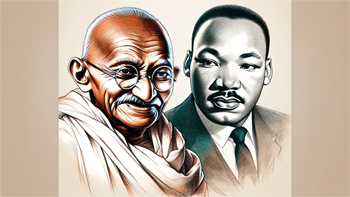Biographies of influential figures not only provide a window into the lives of those who have significantly shaped our world, but also underscore how holidays around the globe often commemorate these remarkable individuals. From leaders who have championed nations and movements for change to those who have sparked controversy and left indelible marks on history, these biographies offer deep insights into their motivations, challenges, and enduring legacies. These figures, celebrated through national holidays, reflect their profound impact on society, politics, culture, and global events. Whether they were liberators, peaceful movement leaders, or figures of war and political strife, their stories are interwoven into the world's rich tapestry.
George Washington
George Washington, the first President of the United States and a Founding Father, was born on February 22, 1732. Presidents' Day, celebrated on the third Monday of February, honors Washington's legacy as a leader who played a crucial role in the founding of the United States. His contributions to forming a new nation are remembered and revered in American history.
Mahatma Gandhi
Mahatma Gandhi, a symbol of peace and non-violent resistance, played a pivotal role in India's struggle for independence from British rule. Born on October 2, 1869, in Porbandar, India, Gandhi's philosophy of non-violent civil disobedience influenced movements for civil rights and freedom across the world. Gandhi Jayanti, observed on his birthday, is a national holiday in India, celebrating his contributions to peace and Indian independence. His legacy continues to inspire peaceful protests and movements for social justice globally.
Martin Luther King Jr.
Martin Luther King Jr., an American Baptist minister and civil rights leader, was born on January 15, 1929. Martin Luther King Jr. Day, observed on the third Monday of January, commemorates his role in advancing civil rights using nonviolent civil disobedience based on his Christian beliefs. King's leadership in the civil rights movement and his famous "I Have a Dream" speech remain influential in the ongoing fight for racial equality in the United States and worldwide.
Nelson Mandela
Nelson Mandela, South Africa's anti-apartheid revolutionary, political leader, and philanthropist, was born on July 18, 1918. Mandela Day, celebrated on his birthday, honors his efforts in fighting apartheid and his role as the first black president of South Africa. His dedication to combatting racial inequality and his commitment to reconciliation in a divided country have made him a global icon for human rights and an emblem of resilience and forgiveness.
Mother Teresa
Mother Teresa, born on August 26, 1910, in Skopje, was an Albanian-Indian Roman Catholic nun and missionary. In Albania, Mother Teresa Day is observed to honor her humanitarian work and her dedication to helping the poor, sick, orphaned, and dying. She is remembered for her compassion and service to the less fortunate, and her life's work is a testament to the power of kindness and charity.
Simón Bolívar
Simón Bolívar, a Venezuelan military and political leader, played a key role in Latin America's successful struggle for independence from the Spanish Empire. Born on July 24, 1783, Bolívar is celebrated for his efforts to liberate several nations and his vision of a united Latin America. His legacy is marked by various holidays, including Simón Bolívar Day, celebrated in several countries across Latin America.
Adolf Hitler
Adolf Hitler, born on April 20, 1889, in Austria, was a German politician and leader of the Nazi Party. His policies led to World War II and the Holocaust, causing immense suffering and loss of life. While not honored with a holiday, his actions and the catastrophic consequences of his regime are remembered as a dark chapter in history, serving as a reminder of the dangers of fascism and unchecked power.
Joseph Stalin
Joseph Stalin, born on December 18, 1878, in Georgia, was the leader of the Soviet Union from the mid-1920s until his death in 1953. Under Stalin's rule, the Soviet Union was transformed from a peasant society into an industrial and military superpower. However, his tenure was marked by widespread repression, terror, and famine, leading to the deaths of millions. His legacy remains controversial, and his actions are remembered as part of the complex history of the 20th century.
Benito Mussolini
Benito Mussolini, born on July 29, 1883, in Italy, was a politician and journalist who led the National Fascist Party. He ruled Italy as Prime Minister from 1922 to 1943 and is known for his role in establishing a fascist dictatorship. Mussolini's regime, marked by aggressive expansionism and brutal suppression of dissent, contributed to the outbreak of World War II. His rule and fall are crucial in understanding the rise and fall of fascism in Europe.
Nation Builders and Their Legacies
Sheikh Mujibur Rahman, often referred to as the "Father of the Nation" in Bangladesh, was a leading figure in the country's struggle for independence. His leadership in the Bangladesh Liberation War led to the establishment of Bangladesh in 1971. March 26th, Bangladesh's Independence Day, commemorates his declaration of independence. Mustafa Kemal Atatürk, the founder of modern Turkey, is celebrated for transforming the remnants of the Ottoman Empire into a secular, democratic nation. His reforms in various sectors established the foundation of the current Republic of Turkey, with October 29th, Republic Day, marking the establishment of the republic. Muhammad Ali Jinnah, known as the "Father of the Nation" in Pakistan, was a key leader in the movement for an independent Muslim nation, leading to the creation of Pakistan in 1947. His efforts are commemorated on December 25th, his birthday, now observed as Quaid-e-Azam Day in Pakistan. These leaders, each in their own nations, played pivotal roles in shaping the political landscapes and national identities of their respective countries.
These figures, each in their own right, have left profound impacts on the world. Some are celebrated for their contributions to freedom and justice, while others serve as stark reminders of the consequences of tyranny and oppression. Understanding their lives, ideologies, and actions provides valuable insights into the complexities of history and the continual shaping of our modern world.
